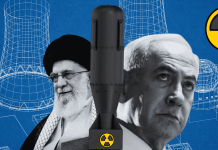The Israeli Air Force (IAF) has grounded an F-16 squadron stationed at Ramon Air Base for three weeks following two serious incidents of incorrect target attacks in Gaza.
Local media reported that the errors, deemed a “landmark error” by the IAF, occurred twice within two weeks, highlighting critical issues in target verification and adherence to operational procedures.
The first incident involved the entry of incorrect coordinates on the ground, leading to an unintended target being struck.
Despite procedural changes implemented after this initial mistake, a similar error occurred just days later during an overnight mission aimed at five targets in the Gaza Strip. In this second incident, a digit in one of the target coordinates was mistyped, resulting in another incorrect target being attacked.
“There was no compliance with procedures for verifying targets on the ground,” an IAF spokesperson stated, attributing the mishaps to “negligence in entering the waypoints, failure to comply with procedures in performing additional controls by the crew, [and] failure to change habits — even though the procedures were changed after the first mistake.”

Fortunately, neither incident resulted in damage or casualties. Nonetheless, the IAF’s decision to ground the squadron as a precautionary measure aims to prevent future occurrences and reinforce the importance of strict adherence to targeting procedures.
The IAF is likely to conduct a thorough investigation to understand the underlying causes of these repeated errors and to implement more robust measures to prevent future occurrences.
This grounding follows another significant blunder by the IAF nearly a month earlier when a combat aircraft inadvertently dropped a bomb meant for Gaza on Israeli territory.
The unexploded bomb was discovered on May 17 in Yated village, near the Gaza border. The bomb had fallen off a fighter jet during operations over Rafah, landing perilously close to residential areas and posing a serious risk to local inhabitants.
While authorities did not disclose the specific type of bomb or the model of the aircraft involved, photographs of the unexploded munition indicated that it landed near residential areas, potentially endangering lives and property.
These incidents underscore the critical need for rigorous compliance with operational protocols to ensure precision in military operations and the safety of both military personnel and civilians.
Escalating tensions in the Middle East
The grounding comes at a particularly sensitive time, given the heightened tensions and ongoing conflict in the region. The precision of military operations is paramount, not only for operational success but also for maintaining international credibility and minimizing unintended consequences.
Israeli Prime Minister Benjamin Netanyahu announced that the “intense phase of the war with Hamas in Gaza is about to end.” However, he emphasized that Israel’s military operations in Gaza would persist until the militant group Hamas was eliminated.
In an exclusive interview with Channel 14 Television, his first with local Israeli media since the hostilities began on October 7, Netanyahu stated, “It doesn’t mean that the war is going to end, but the war in its current stage is going to end in Rafah. This is true. We will continue mowing the grass later.”
The southern Gazan city of Rafah has been a focal point of Israel’s recent military efforts. Before the air and ground operations began, more than a million Palestinians had sought refuge in Rafah.
The offensive has displaced approximately 800,000 people, creating what the United Nations food agency described as “apocalyptic” conditions. Despite international calls to cease operations, Israel has continued its campaign in Rafah, leading to severe humanitarian consequences.
The Rafah border crossing with Egypt, a crucial channel for humanitarian aid, has remained shut since Israeli forces took control early last month. This closure has exacerbated the dire situation for those in the city.
International scrutiny of Israel’s actions in Gaza has intensified. The UN’s top court recently ordered an immediate halt to the military operation in Rafah, citing the disastrous humanitarian impact.
Yet, Netanyahu remains resolute in his stance against Hamas. He revealed a willingness to negotiate “a partial deal” with Hamas for the return of some hostages still held in Gaza but reaffirmed that military efforts would continue until Hamas was eliminated. “I’m not ready to give that up,” he asserted.
Also, Netanyahu indicated that the Israeli military’s focus might soon shift to the northern border with Lebanon, where clashes with the Iran-backed Hezbollah have intensified in recent weeks. This potential shift underscores the broader regional instability and the complex dynamics Israel faces on multiple fronts.
- Contact the author at ashishmichel(at)gmail.com
- Follow EurAsian Times on Google News




